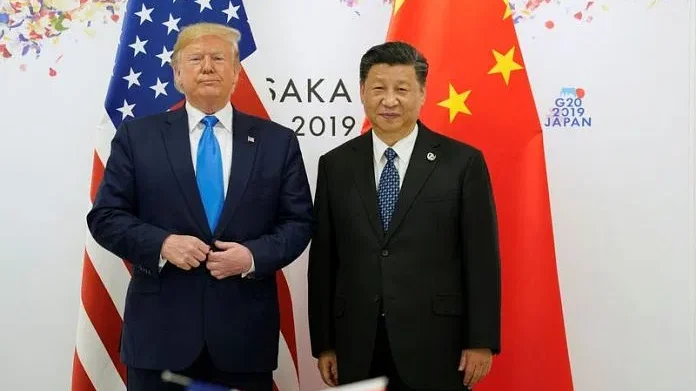The world watched, transfixed, as Ukrainian President Volodymyr Zelenskyy and United States President Donald J Trump, alongside Vice President JD Vance, clashed in a fiery, live-on-air spat at the White House. Sharp exchanges, diplomatic decorum tossed aside—raw, unscripted, and unprecedented. In China, where political theatre follows a carefully scripted playbook, such chaos is unfathomable. The notion of Xi Jinping engaging in a televised war of words? Impossible. Yet, the conversation in China is not just about the drama—it is about how this reshapes Beijing’s role in the global power game.
The real target?
A key narrative in Chinese commentary suggests that Trump’s willingness to negotiate with Russia stems from his broader strategic focus on China. He appears ready to realign with Russia, downplaying support for Ukraine to consolidate the US stance against Beijing. While Joe Biden’s policies brought China and Russia closer, Trump seeks to recalibrate the balance, seizing new opportunities in the China-US rivalry.
Xue Kaihuan, a Chinese PhD scholar, argues that Trump’s eagerness to resolve the Ukraine issue is driven by a desire to “unite with Russia to contain China.” Some warn against falling into the ‘China responsibility’ theory trap, suspecting that the West will attempt to shift blame onto Beijing, sow discord between China and Russia, and question China’s efforts for peace.
However, many Chinese commentators are of the opinion that the China-Russia relationship has been carefully cultivated over decades, making any attempt to break up their partnership unrealistic. Shen Yi, a professor of international politics at Fudan University, notes that every time Trump engages with Putin, speculation arises about its implications for China. He emphasises that Beijing should maintain strategic patience rather than react impulsively to external pressures. Shen sums it up with a poetic Chinese phrase: “He crosses the river while the bright moon shines upon it”—a metaphor for staying the course amid global uncertainty.
Also read: Beijing has a chance to broker peace in Ukraine. It’s a Trump tactic, say the Chinese
China’s ‘sweet spot’
While China’s stance on the Russia-Ukraine conflict has made Kyiv uneasy, many Chinese analysts suggest that Zelenskyy will now turn to Beijing after feeling humiliated by the US. One observer highlights that Chinese wisdom, deeply rooted in its culture, offers valuable lessons for Ukraine’s diplomatic strategy. The principle of “harmony without difference” could serve as a guide. By drawing on Chinese philosophical insights and adopting strategic approaches in diplomacy, economy, education, and politics, Ukraine could achieve national stability, prosperity, and long-term development.
At the same time, Beijing remains in a ‘sweet spot’ for post-war reconstruction. Some Chinese experts have proposed a “grain-for-reconstruction” strategy, where Ukraine trades its grain and mineral resources for China’s infrastructure expertise in a mutually beneficial deal.
China’s sweet spot extends beyond reconstruction. A Chinese commentator notes that in a world marked by resource competition and geopolitical manoeuvring, Beijing’s stance presents a fair and rational solution for the global community. Many discussions focus on China’s model of responsible global leadership, contrasting it with the West, which, according to many voices on the Chinese internet, fuels power politics and regional fragmentation.
There is also debate over Europe’s influence on Ukraine and the limits of cooperation. Shiping Tang, a distinguished professor at Fudan University, suggests that Ukraine could take a lesson from Vietnam. Despite past conflicts and a Soviet alliance against China (1975–1989), Vietnam has long pursued a middle way between Beijing and other global powers. Instead of rigid neutrality, it has adopted a pragmatic approach, recognising that diplomacy is about strategic balance rather than emotional gratification.
Also read: China’s 2025 economic agenda – boost domestic consumption, create buffer against Trump
Trump’s strategy and China’s calculations
Trump’s ‘chaotic’ approach may create opportunities for China, giving it space to strengthen its position and accelerate development. On Weibo, debates over Taiwan were prominent, with many questioning whether it could be the next to face abandonment if Trump withdraws support from Ukraine.
The general consensus is that this situation could allow China to secure a more prominent role. A commentator outlined several steps China should take as Trump positions himself at the centre of negotiations. First, China should demonstrate international responsibility by providing humanitarian assistance. It should also promote peaceful conflict resolution through multilateral platforms, while maintaining a neutral stance and avoiding direct involvement in the war. Additionally, while preserving its relations with Russia, China should acknowledge and respect Ukraine’s sovereignty and interests.
China has already been involved in reconstruction projects in Ukraine and will likely expand its efforts, potentially integrating these projects into the Belt and Road Initiative. However, whether this truly puts Beijing in a ‘sweet spot’ remains to be seen; only time and the evolving Trump-Zelenskyy-Putin dynamic will determine that.
This situation, concurrently, presents Trump with a unique opportunity. He could position himself as the US president who not only avoided starting a war but also ended one—overtaking China’s image of a ‘peace broker’. Additionally, it could serve as a strategy to reintegrate Russia into the global fold, ultimately weakening the China-Russia partnership by offering Moscow more alternatives.
Of course, Chinese analysts recognise the challenges in achieving this outcome. But if even a fraction of this aligns with Trump’s strategy, he seems to be taking a page from Beijing’s playbook: neutralising peripheral distractions to zero in on the ultimate objective. For him, Ukraine and Russia are the side battles; China is the endgame.
Sana Hashmi is fellow at Taiwan Asia Exchange Foundation. She tweets @sanahashmi1. Views are personal.
(Edited by Theres Sudeep)







Just asking… Where is India, the Vishwaguru in such discussions of geopolitics? The show-off (rockstar welcome ceremonies paid by Indian government) by Modi has evoked strong racial feelings against the Indians in USA. I just hope that it should not become worse.